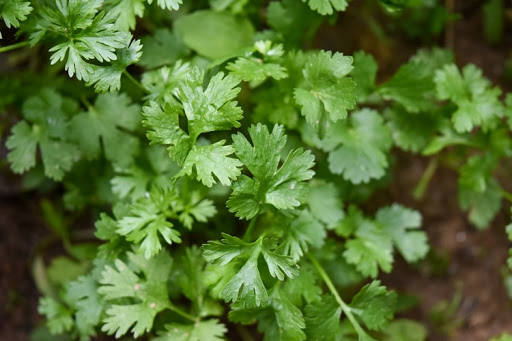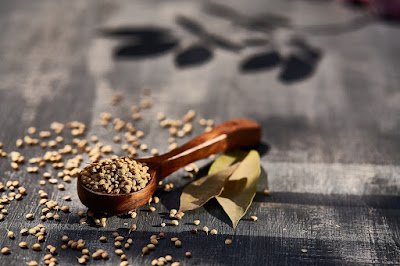Coriander leaves are also known as “cilantro,” and the best for garnishing soup, pasta and salads, lentils, fresh tomato sauce, or Thai noodle dishes. You can also puree garlic, peanuts, coconut milk, and lemon juice to make a paste for burritos, salsa, or marinades.
Coriander, Chinese parsley, or Dania, Coriander is an herb from the Apiaceae family, though its exact origin is not known, it believed to come from North Africa and southern Europe.
Coriander is an herb commonly used to flavor dishes around the world, and it is more common in Mexican cuisine. It is originated from the Coriandrum sativum plant and is related to parsley, carrots, and celery.
It is commonly used in dishes like soups and sauces, as well as Indian, Middle Eastern, and Asian foods like curries and masalas. The coriander leaves are often used as it is, while the seeds can be used dried or ground.
7 Benefits Of Coriander:
1: It Can Help Lower Blood Sugar:
High blood sugar is a risk factor for type 2 diabetes. Coriander seeds, extract, and oils can help lower blood sugar. People who have low blood sugar or take diabetes medications should be cautious with coriander because it is very effective in lowering blood sugar.
Some studies report that coriander seeds lower blood sugar by promoting enzyme activity that helps remove sugar from the blood. It has been observed that the coriander seed extract lowered blood sugar and increased insulin release in rats with diabetes, compared to control animals.
2. It is rich in antioxidants:
Coriander is rich in immunostimulants, since this food contains several antioxidants, which prevent cell damage caused by free radicals. Its antioxidants can fight inflammation.
These compounds include terpinene, quercetin, and tocopherols, which can have anti-cancer, immunostimulating, and neuroprotective effects, according to scientific studies.
A test-tube study found that the antioxidants in coriander seed extract reduced inflammation and slowed the growth of lung, prostate, breast, and colon cancer cells.
Some studies suggest that coriander may lower heart disease risk factors, such as high blood pressure and LDL (bad) cholesterol levels.Coriander extract appears to act as a diuretic, helping our bodies eliminate excess sodium and water. This can lower blood pressure.
Some research indicates that coriander can also help lower cholesterol. One study found that rats given coriander seeds experienced a significant decrease in LDL (bad) cholesterol and an increase in HDL (good) cholesterol.
Additionally, many people find that eating hot herbs and spices like coriander helps them reduce their sodium intake, which can improve cardiovascular health.
In populations that consume large amounts of coriander, among other spices, rates of heart disease tend to be lower, especially compared to people who follow the Western diet, which contains more salt and sugar.
4. It can protect brain health:
Many brain ailments, such as Parkinson’s, Alzheimer’s, and multiple sclerosis, are associated with inflammation.The anti-inflammatory properties of coriander can protect against these diseases. Another study found that coriander extract provides some protection against nerve cell damage after drug-induced seizures, likely due to its antioxidant properties.
Coriander may help to leave an improved memory, suggesting that the plant may have applications for Alzheimer’s disease. Coriander can also help control anxiety.
5. It can promote digestion and gut health:
The oil extracted from coriander seeds can speed up and promotes healthy digestion.
An 8-week study in 32 people with irritable bowel syndrome (IBS) found that 30 drops of a herbal medicine containing coriander taken three times a day significantly decreased abdominal pain, bloating, and discomforts, compared to a placebo group.
Coriander Extract is used as an appetite stimulant in traditional Iranian medicine.
6. It can fight infection:
Coriander contains antimicrobial compounds that can help fight certain infections and food borne illnesses. Dodecenal, a compound in coriander, can fight bacteria like Salmonella, which can cause life-threatening food poisoning.
Additionally, a test-tube study revealed that coriander seeds are among several Indian spices that can fight bacteria responsible for urinary tract infections (UTIs). Other studies suggest that coriander oil should be used in antibacterial formulations due to its ability to fight food borne illnesses and hospital-acquired infections.
7. It can protect your skin:
Coriander can have several benefits for your skin, even for mild skin rashes like dermatitis. In one study, its extract failed to treat baby diaper rash on its own, but it can be used in conjunction with other calming compounds as an alternative treatment.
Other studies indicate that the antioxidants in coriander extract can help prevent cell damage that can lead to accelerated skin aging, as well as skin damage from ultraviolet B radiation. Many people use coriander leaf juice for skin conditions such as acne, pigmentation, oiliness, or dryness. However, research on these uses is lacking. You can easily add it to your diets.
It has great nutritional properties and a great way to enjoy them is by preparing tea. Coriander tea can cause allergic reactions or produce irritations in some people, it is not recommended to consume it during pregnancy or while breastfeeding.
Coriander is one of the most used herbs in the world, discover all the benefits that your tea has and how to prepare it easily.
BENEFITS OF CORIANDER TEA:
Helps reduce cholesterol levels.
Regulates glucose levels in the blood.
Fight bad breath.
Supports digestion and accelerates metabolism.
It has antibiotic properties that help in the treatment of salmonella, it also helps to eliminate bacteria.
Helps fight fluid retention.
It is a powerful anti-inflammatory that relieves joint pain caused by rheumatoid arthritis.
It is a natural antibacterial, so it can be applied to wounds to avoid infections.
Its vitamins A and C help fight flu and colds.
Thanks to the fact that it helps to eliminate toxins and improves digestion, it is a good ally for losing weight.
Relieves stomach pain and nausea.
Reduces and balances hormonal changes related to menstruation.
HOW TO PREPARE CORIANDER TEA:
INGREDIENTS:
3 sprigs of coriander
1 cup of water
PROCESS:
Wash and disinfect the leaves well.
Put the water on the flame in a pot and when it starts to boil add the coriander.
Boil for a couple of minutes, then wait for 10 minutes.
Strain the leaves and drink the tea.
All parts of the Coriander plant are edible, but its seeds and leaves taste very different.
While coriander seeds have an earthy taste, the leaves are tangy and citrus, although some people find that they taste like soap.
The whole seed can be added to baked goods, pickled vegetables, massages, roasted vegetables, and cooked lentil dishes.
Heating them releases their aroma, after which they can be ground for use in pasta and dough.




